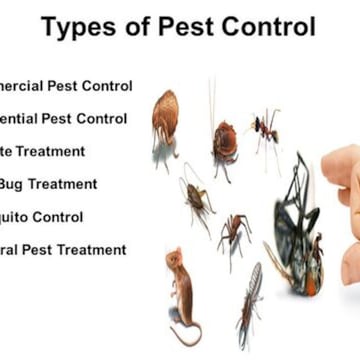All About Pest Control
All About Pest Control
Blog Article
Our Pest Control Ideas
Table of ContentsHow Pest Control can Save You Time, Stress, and Money.Indicators on Pest Control You Need To KnowThe 10-Minute Rule for Pest ControlHow Pest Control can Save You Time, Stress, and Money.The Basic Principles Of Pest Control
Limitations of Chemical Administration Have the ability to analyze insect troubles, identify if administration is needed, and make ideal suggestions making use of IPM techniques. Recognize with various techniques of pest administration - their advantages and limitations. Comprehend the worth of advantageous insects. It is not possibleor even desirableto rid gardens of all parasites.This chapter talks about (IPM), a strategy that makes use of understanding concerning insects and their, methods, nonchemical techniques, and pesticides to manage pest issues. Extra info regarding IPM for details plants is included in chapters that focus on those plants. Parasites in a garden or landscape might include insects and mites, weeds,, animals, and birds.
Pests and weeds, however, play a role in the. After growing a garden or developing a grass, the all-natural procedure of plant sequence begins to restore and nonnative plants.
What we call "bugs" are component of an all-natural system at work. An ecosystem has no insects. Only people think about certain species bugs when they take place where they are not desired. We will be much more successful in handling unwanted species when we realize that these microorganisms adhere to foreseeable patterns that we can utilize to our benefit.
Some Known Questions About Pest Control.
Insects susceptible to a chemical were rapidly eliminated, leaving immune ones to breed and increase. It ended up being clear that chemicals alone would certainly not resolve all pest troubles. Instead, overuse of chemicals caused the development of resistant insects. Researchers began to develop a brand-new approach to pest control. This brand-new method was described as integrated parasite administration (IPM).
An IPM strategy permits some level of bugs in the setting. Insects are a lot less likely to make it through a program that makes use of several techniques of decreasing their populaces. Integrated pest management was very first recommended by entomologists due to the fact that bugs were the initial team of pests to show tough to take care of with chemicals alone.
insect and host precisely. and take into consideration economic or aesthetic injury. A threshold is the factor at which activity should be taken. a treatment technique utilizing mechanical, cultural, organic, or chemical controls, or a mix of these visit this site approaches. success of therapies. IPM has extended beyond bugs to administration of all pest populations: weeds, illness microorganisms, and animals.
Pest Control Things To Know Before You Buy
Monitoring rather than obliteration of pests is the objective. An IPM plan begins with a careful evaluation of each bug infestation.
Clover expanding in a grass may be considered as an undesirable weed, but as a vegetable it is manufacturing nitrogen for the soil and the blossoms are offering nectar to honey and various other. Tolerance for some weeds may be component of an IPM plan. might be consuming the leaves of a plant, yet when they are determined as the larvae of Eastern tiger swallowtail butterflies, their damages may be tolerated so check we can appreciate the lovely butterfly.

The second most crucial device in parasite administration is very early intervention. Reacting to troubles quickly, prior to they have time to multiply, visit needs a much less dramatic intervention.
Pest Control Fundamentals Explained
Many safe, useful, nonchemical techniques of plant defense and pest administration might lower or remove the need to spray. Other techniques are most valuable when used with pesticides. To implement management practices appropriately and to minimize losses, gardeners ought to know the kinds of pests that attack plants and understand pest biology.

Carrying out a dirt examination and using only the recommended amount of plant food and lime makes the most of the advantage to the plant while reducing issues connected to too much use of plant food - Pest Control. Treatment the soil with a number of inches of compost safeguards the plant in numerous methods: lowering soil water loss to evaporation, lessening weed competitors, giving nutrients, and producing a suitable setting for earthworms and microbes that keep the soil loosened for origins and damage down organic material to release nutrients
If mulch touches the trunk, it can produce a way for voles, germs, and fungis to assault the plant. Do not make use of manure or compost that has not completely disintegrated as a leading clothing since it can encourage unfavorable bugs. Research study suggests that farming is damaging to soil framework.
Getting The Pest Control To Work
If tilling is regarded needed, consider doing it in the loss when the life cycles of numerous pests brings them near the surface area. At the surface, bugs come to be subjected to the weather condition as well as birds and other natural enemies.
Report this page